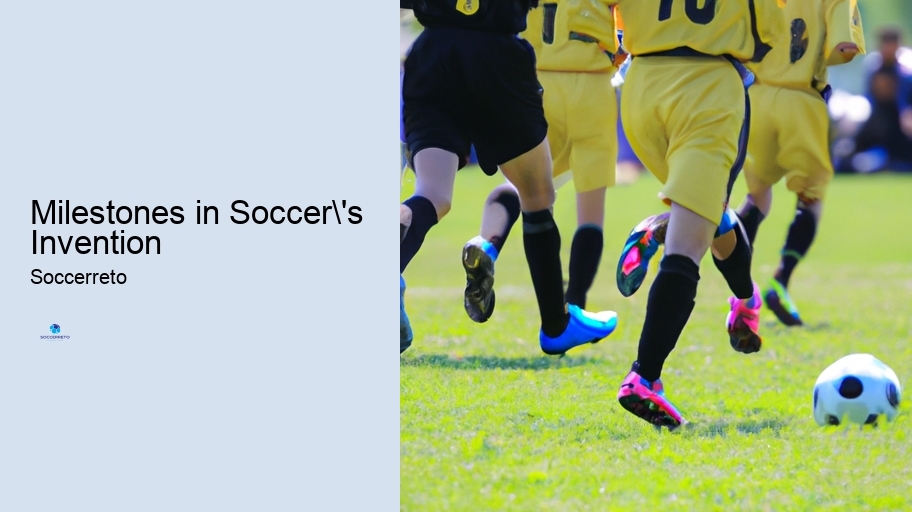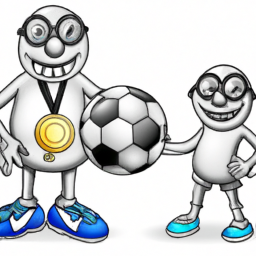

The 19th century was a crucial period in the development of soccer. Before this era, football was played with varying rules and lacked uniformity. Schools, clubs, and regions had their own interpretations of the game, leading to inconsistencies in how football was played.
The turning point came in 1863 with the establishment of the Football Association (FA) in England. Eton College The FA's primary objective was to standardize the rules of football, leading to the creation of the Laws of the Game. This marked the birth of association football, the precursor to modern soccer.
The 19th century witnessed the gradual transition from chaotic and diverse forms of football to a more organized and structured sport. This period set the stage for soccer's rapid global expansion in the 20th and 21st centuries, making it the world's most popular sport.
The emergence of standardized rules in the 19th century paved the way for the first organized soccer competitions. One of the earliest recorded soccer competitions was the FA Cup, inaugurated in 1871. This knockout tournament allowed clubs to compete for the prestigious trophy, and it quickly gained popularity, becoming one of the oldest soccer competitions in the world.
Another notable competition was the British Home Championship, established in 1884. It featured the national teams of England, Scotland, Wales, and Ireland (later Northern Ireland). The tournament not only showcased the best of British soccer but also promoted international rivalry.
These early competitions laid the foundation for modern soccer tournaments and leagues. They provided a platform for clubs and national teams to showcase their skills and fostered a sense of competition and camaraderie that continues to define the sport today.
Soccer has transcended the boundaries of sport to become a cultural phenomenon with a profound impact on societies around the world. The sport's ability to unite people across languages, borders, and cultures is unparalleled. Soccer has inspired art, music, literature, and even political movements.
Iconic moments in soccer history, such as Diego Maradona's "Hand of God" goal or Pele's stunning performances in World Cups, have become cultural touchstones.
Soccer's cultural significance extends beyond the field, shaping national identities, fostering a sense of belonging, and providing a common language for fans globally. It is not just a sport; it is a way of life for millions, a source of inspiration, and a reflection of the human spirit.

Soccer made its Olympic debut at the 1900 Paris Olympics as part of the official program. This historic inclusion marked a significant milestone in the sport's global recognition. The tournament featured three teams: France, Belgium, and a British team representing Great Britain and Ireland.
The British team secured the gold medal, becoming the first Olympic soccer champions. Subsequent Olympic soccer tournaments continued to showcase the sport's growth, with more nations participating and expanding its global reach.
While the Olympic soccer tournament is not as prestigious as the FIFA World Cup, it remains an important part of soccer history, providing a platform for emerging talents and promoting international goodwill through the beautiful game.
Soccer has evolved significantly in the modern era, marked by technological advancements, increased globalization, and the rise of commercialization. The sport has become more than just a game; it's a global industry with massive fan followings, lucrative sponsorship deals, and modern stadiums equipped with cutting-edge technology.
Leagues such as the English Premier League, La Liga, and Serie A have become household names, attracting the best talent from around the world. Television broadcasts and digital streaming platforms have made it possible for fans to watch matches from any corner of the globe.
In the modern era, soccer has become a powerful force in promoting social causes, with players and clubs using their platform to raise awareness about issues like racism, equality, and sustainability. The sport's impact on society continues to grow, making it more than just a game but a force for positive change.


The face of soccer has undergone a remarkable transformation in recent decades. With the advent of globalization and the internet, the sport has become accessible to fans worldwide. The way soccer is played, watched, and even managed has evolved significantly.
Tactically, soccer has seen innovations with new formations, pressing strategies, and player roles. Coaches like Pep Guardiola and Jurgen Klopp have revolutionized the game with their unique approaches, while analytics and data-driven insights have become integral to decision-making on and off the field.
Off the pitch, soccer's financial landscape has changed dramatically, with skyrocketing transfer fees, lucrative television deals, and the emergence of superclubs. Additionally, social media has connected fans and players like never before, offering a glimpse into the personal lives of their favorite stars.
Soccer's roots are diverse and stretch across continents and centuries. OFC While the modern game is often associated with England, its origins can be traced back to various early ball games played by ancient civilizations. For example, in ancient China, "cuju" involved kicking a ball into a net, and the Greeks played "episkyros," a game with similarities to soccer.
Indigenous peoples in North America also had their own ball games, like the Native American sport of "pasuckuakohowog," which involved kicking a ball through goals. These diverse roots reflect humanity's universal fascination with using feet to control and move a ball, an enduring theme that connects cultures worldwide.
Soccer's global appeal today can be attributed to its diverse origins, as it incorporates elements from various cultures and regions, creating a sport that transcends boundaries and unites people from all walks of life.

Answer: The first Football Association was formed in England in 1863. It was the first governing body for the sport of soccer, responsible for standardizing the rules and organizing matches. The FA is still in existence today and plays a pivotal role in English soccer.
Answer: Soccer, as we know it today, was not invented by a single individual. It evolved over centuries with various forms of football played in different cultures. However, the modern rules of soccer were formalized in England in 1863 with the founding of the Football Association (FA), making England the birthplace of modern soccer.
Answer: Since its formalization in 1863, soccer has undergone numerous changes. The rules have been refined, the size and structure of the ball have evolved, and the introduction of international competitions like the FIFA World Cup has occurred. The sport has also seen significant growth in professional leagues, women's soccer, and youth development programs.